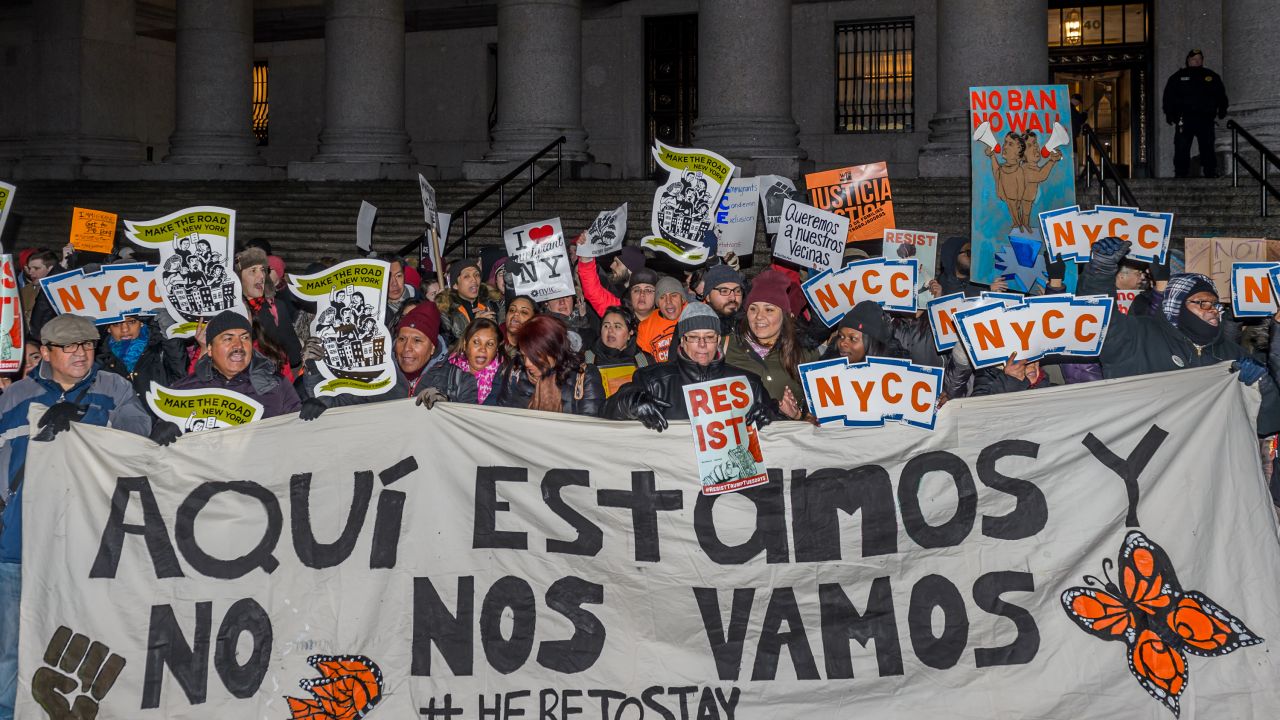
In response to Immigration and Customs Enforcement (ICE) raids and deportations happening across the country, about a thousand people held a rally in front of ICE offices in New York City, followed by a march to demand an end to the attacks on immigrants. (Photo by Erik McGregor/Pacific Press/LightRocket via Getty Images)
We produce this news digest every weekday. You can to receive these updates as an email newsletter each morning.
ICE raids –> In the last few days, hundreds of undocumented immigrants have been rounded up as Donald Trump proclaimed he was fulfilling a campaign promise. Vice reports that New York alone saw some 40 arrests. An Atlanta-based immigration lawyers tells The Washington Post that in some Hispanic communities, agents were going door-to-door, asking to see papers. “A DHS official confirmed that while immigration agents were targeting criminals, given the broader range defined by Trump’s executive order, they also were sweeping up noncriminals in the vicinity who were found to be lacking documentation,” Lisa Rein, Abigail Hauslohner and Sandhya Somashekhar write for The Post. “It was unclear how many of the people detained would have been excluded under Obama’s policy.”
At Slate, Henry Grabar runs through the ways this latest immigration crackdown differs from what might have happened under President Obama.
DAPL goes to court –> As work continues on the Dakota Access Pipeline, the Associated Press reports that a federal judge in Washington, DC, will hear arguments later today about whether or not construction should be halted while lawsuits filed by the Standing Rock Sioux against the pipeline play out.
Meanwhile, The Guardian reports that military veterans from across the country are planning to stand in support of the Native Amerians and block the pipeline. “The growing group of military veterans could make it harder for police and government officials to try to remove hundreds of activists who remain camped near the construction site and, some hope, could limit use of excessive force by law enforcement during demonstrations,” Sam Levin writes. Elizabeth Williams, a 34-year-old air force veteran, tells Levin, “We are prepared to put our bodies between Native elders and a privatized military force. We’ve stood in the face of fire before. We feel a responsibility to use the skills we have.”
All up in legislators’ grills –> The Trump administration has ushered in a wave of citizen protests across America. Republican Jason Chaffetz, who, as chair of the House Government and Oversight Committee, is perhaps the member of Congress best positioned to push back against Trump’s conflicts of interest, is one target. After a boisterous town hall in Utah, Chaffetz told The Washington Post, “he would not be swayed by angry crowds, phone calls, emails or tweets.” Meanwhile, back on Capitol Hill, he will “begin the rare act of dismantling a DC law — one that allows for assisted suicide — despite the wrath of District residents who are planning a massive ‘Hands off DC’ rally and accuse him of bullying the city to pander to his conservative base.”
Rep. Dave Brat, the Virginia Republican who, riding an anti-status quo wave in 2013, defeated House Majority Leader Eric Cantor, also recently complained about protests — to the delight of activists — announcing that “since Obamacare and these issues have come up, the women are in my grill no matter where I go,” Claire Landsbaum writes for New York magazine. The Democratic Party, Paul Kane reports, is scrambling to figure out ways to harness all this activist energy.
At our site, Karin Kamp profiles the Indivisible Movement, one of the groups behind this new wave of action.
Arctic temperatures skyrocket –> This weekend saw record high temperatures in the Arctic, Chelsea Harvey reports for The Washington Post: “It’s at least the third such extreme winter-warming event for the Arctic this season — temperatures skyrocketed on two occasions in November and December as well. Similar incidents also occurred in December of 2015 and 2014.”
This news follows a winter in which sea ice levels are hitting record lows. “Sea ice extent during January was 487,000 square miles below the January 1981 to 2010 long-term average. This means the Arctic was missing an area of sea ice about the size of South Africa,” Andrew Freedman writes for Mashable. “Keep in mind that this is the middle of winter, when much of the high Arctic is still shrouded in darkness.”
Treasury vote –> Treasury Secretary-designate Steve Mnuchin likely will face a confirmation vote late today, The Hill reports. It’s doubtful that any Republicans will cross party lines that would allow Democrats to block the vote, but “senators will have up to seven hours to debate Mnuchin’s nomination on Monday, setting up a final vote for 7 p.m.,” Jordain Carney writes. Meanwhile, Ben White reports for Politico that Mnuchin, a Goldman Sachs veteran, is considering senior Goldman Sachs banker Jim Donovan for deputy Treasury secretary, putting two alumni of the same bank in charge of the treasury. Foxes, meet henhouse.
Confusion at the National Security Council –> The Wall Street Journal reports that Donald Trump is considering firing national security adviser Mike Flynn after reports surfaced that he had been less than candid about contacts with Russia before Trump became president. They may have included talks about lifting the Obama sanctions imposed to punish Russia for tampering with our elections. Meanwhile, The New York Times provides a look inside the council, where “staff members get up in the morning, read President Trump’s Twitter posts and struggle to make policy to fit them. Most are kept in the dark about what Mr. Trump tells foreign leaders in his phone calls. Some staff members have turned to encrypted communications to talk with their colleagues, after hearing that Mr. Trump’s top advisers are considering an ‘insider threat’ program that could result in monitoring cellphones and emails for leaks.”
Morning Reads was compiled by John Light and edited by Michael Winship.
We produce this news digest every weekday. You can to receive these updates as an email newsletter each morning.



